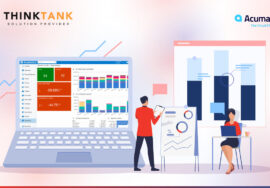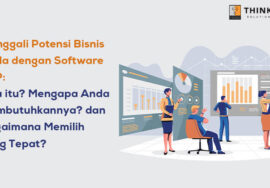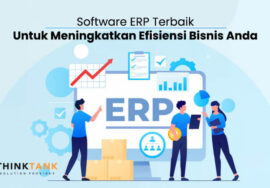
Harness the Power of Cloud-Based ERP: An Essential Guide
Are you looking for an easier way to manage your business operations? Cloud-based ERP is the answer. This blog post provides an essential guide to harnessing the power of cloud-based ERP. It outlines the benefits of using cloud-based ERP, compares different types of solutions available, and provides tips for selecting the right ERP solution for your business. With Acumatica cloud ERP, businesses can benefit from a centralized platform that eliminates data silos, reduces manual errors, and enhances overall efficiency. By understanding all aspects of cloud-based Enterprise Resource Planning (ERP), you can make an informed decision on how to best optimize your operations and maximize productivity.
Benefits of cloud-based ERP
Cloud-based ERP is a powerful and versatile tool that can help businesses increase their scalability, reduce costs, and improve collaboration and communication between teams. This section will discuss the various benefits of using cloud-based Enterprise Resource Planning (ERP) solutions.
One of the key advantages of cloud-based ERP is increased scalability. With cloud-based ERP, businesses can quickly scale up or down their operations in response to changing market conditions. This helps businesses save time and money by avoiding costly investments in infrastructure that may not be needed in the long run. Additionally, cloud-based ERP solutions allow businesses to access data on demand from anywhere in the world, reducing operational costs and improving efficiency.
Another advantage of using cloud-based ERP solutions is reduced risk of disruption due to server or system failure. Since cloud-based ERP solutions are hosted on remote servers, they are not dependent on local hardware or software failures that can lead to downtime. Additionally, most providers offer industry standard security protocols to protect data from unauthorized access. This ensures that your business operations remain secure even if there is an unexpected interruption in service.
Finally, cloud-based ERP solutions enable improved collaboration and communication between teams by providing real-time access to business data across multiple departments or locations. This makes it easier for teams to share information quickly and accurately without having to rely on manual processes such as emailing documents back and forth or waiting for files to be passed around manually via flash drives or other physical devices. This eliminates potential delays caused by manual processes while also reducing operational costs associated with printing materials or shipping hard copies of documents between teams who are located in different parts of the world.
The benefits outlined above demonstrate why so many businesses are turning towards cloud-based ERP solutions for managing their operations more efficiently and cost effectively than ever before. By understanding all aspects of this technology, you can make an informed decision on how best to optimize your operations while maximizing productivity at the same time.
Different types of cloud ERP solutions
The cloud has revolutionized enterprise resource planning (ERP) solutions, offering businesses of all sizes a range of options to fit their needs. From Software-as-a-Service (SaaS) to hybrid and private clouds, there is an option for every type of organization. Understanding the differences between these solutions can help you make the right choice for your business.
Software-as-a-Service is usually the most cost effective solution, as it allows businesses to access powerful enterprise applications without purchasing additional hardware or licenses upfront. In this model, fees are typically based on usage rather than a one time payment. Hybrid cloud ERP systems combine public cloud services with on premise infrastructure, granting users greater control over data security while still allowing for scalability and flexibility in terms of project length and commitments. Private clouds provide even more control over sensitive information but tend to be expensive due to hardware requirements.
Open source products are also available which give organizations the freedom to customize software without needing extra licensing fees; however, they may not include dedicated support teams that come with proprietary products. It is important to take into account the size and complexity of operations, budget constraints, usability and scalability options when selecting an ERP solution that meets your current as well as future needs. Additionally, implementation timescales should be taken into consideration if you might need to switch from one system to another down the line.
Choosing the right cloud ERP for your business
Choosing the right cloud ERP for your business is an essential step in taking advantage of the power of cloud-based ERP. To make the best decision, it is important to understand the company’s needs, objectives, and goals, assess existing technology infrastructure and capabilities, research different cloud ERP solutions, evaluate the cost of different vendors, and analyze user feedback and reviews. With this information in hand, you can make an informed decision about the best cloud ERP solution for your business.
When researching different cloud ERP solutions available on the market today, consider factors such as features and functionality. Compare each vendor’s offerings to determine which one meets your particular needs. Look at their pricing structures to find a solution that fits within your budget constraints. Check out customer support options; how quickly do they respond to issues? Also consider scalability options; will you be able to expand your system over time without having to switch vendors?
User feedback can also provide valuable insights into any potential issues with a product or service that may not be evident from marketing materials or sales pitches. Read through reviews from both current and past customers – this will give you a good indication of what it’s like actually using a particular vendor’s platform on a day-to-day basis. Additionally, try getting in touch with other businesses who have used or are currently using a certain solution so they can share their experiences directly with you.
Finally, when evaluating cost versus value for each vendor’s offering, remember that often times there is more than just initial setup fees involved when implementing an ERP system. Consider costs associated with maintenance and upgrades over time; some vendors may offer discounts on these services if bundled together during purchase. Make sure you factor in all costs when making your final decision – both short term and long term – as even small savings can add up over time.
By researching various cloud-based ERP solutions available on the market today and comparing them against each other based on features needed for success as well as user feedback from real customers who have used them before, businesses can make an educated decision about which solution is best suited for them now — and into the future too!
Getting started with cloud ERP implementation
The transition to a cloud-based ERP solution can be daunting, but the right preparation will help ensure that it’s a smooth process. A thorough assessment of your current systems and processes is the first step in getting started, as this will help you identify potential areas for improvement and determine what changes must be made for successful implementation. Afterward, create an implementation plan with timelines and milestones to keep all stakeholders informed of their roles and the project’s objectives. Additionally, testing should be done before going live to make sure everything works as expected when users start interacting with it. Finally, user training is key to ensure successful adoption of the new system – both initially and throughout its life cycle. With these steps taken care of, you can rest assured that your cloud ERP implementation will go off without a hitch.
Why Acumatica is the best choice for cloud ERP
The choice of cloud-based ERP can be a daunting task for any business, but Acumatica offers a robust solution that is easy to use and provides the scalability needed for businesses to grow. With its modern, responsive user interface and built-in mobile capabilities, users can access their data on the go without having to sacrifice performance. Additionally, Acumatica’s scalability allows businesses to grow without having to invest in additional hardware or software.
Acumatica’s integrated platform covers all of a business’s operations from sales, marketing and customer service to accounting and financials. This enables businesses to get deeper insights into their processes and make better decisions faster. Furthermore, Acumatica is secure and compliant with industry standards; it uses role-based security protocols with two-factor authentication so that only authorized personnel can access your data. Plus, you can easily track activity in the system using audit trails which helps ensure compliance with regulations like GDPR.
In addition to these features, Acumatica also offers a variety of add-on products such as project management software and CRM solutions that can be integrated with the platform. This gives businesses complete control over how they manage their operations – enabling them to customize their solution according to their needs. Finally, with its fast implementation timescales and low cost per user compared with other cloud ERP solutions on the market, Acumatica is an ideal choice for any size business looking for an affordable yet powerful cloud-based ERP solution.
Contact ThinkTank Solusindo for a free consultation and discover how Acumatica can transform your business.
- Email: sales@8thintkank.com
- 021-53675015
- Whatsapp: Contact here or Here
- Set session with us : Click here
- Email: sales@8thintkank.com
- 021-53675015
- Whatsapp: Contact here or Here
- Set session with us : Click here








